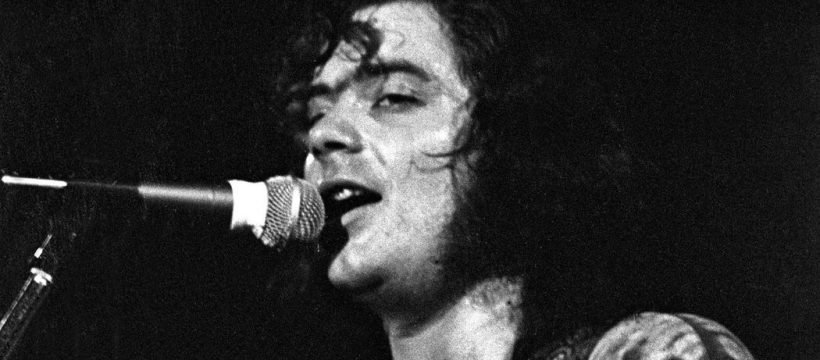Roky Erickson, a defining force in psychedelic rock in the 1960s and the stuff of rock lore ever since, died on Friday. He was 71.
His brother Mikel posted news of his death on Facebook. The posting did not give a cause or location of death, although several news reports say he died in Austin, Tex.
In 1965 Mr. Erickson was invited to join the guitarist Stacy Sutherland, the lyricist and jug player Tommy Hall and others in the Texas band the 13th Floor Elevators, and his powerful, scream-inflected vocals came to define the group. The Elevators had a modest hit with “You’re Gonna Miss Me” in 1966 and late that year released their debut album.
“If not quite the first band to have the now seemingly ubiquitous P-word applied to their music,” Dan Maier wrote in The Guardian in 2015, when surviving members reunited, “their debut album, 1966’s ‘The Psychedelic Sounds of the 13th Floor Elevators,’ delivered a manifesto for better living through chemistry that no previous act had so explicitly set forth.”
As Mr. Erickson sang in “Roller Coaster,” a song off that first album, “After you trip life opens up, you start doing what you want to do.”
But, as he and other band members found out, you also start attracting the attention of the authorities. Mr. Erickson was eventually arrested on drug charges, and that was only the beginning.
In his book “Eye Mind: The Saga of Roky Erickson and the 13th Floor Elevators, the Pioneers of Psychedelic Sound” (2007), Paul Drummond described what befell the short-lived band:
“By the end of 1969, Roky virtually re-enacted the plot of ‘One Flew Over the Cuckoo’s Nest’ when he pleaded insanity and was incarcerated in a maximum security unit of a prison for the criminally insane, Stacy was imprisoned in the jail Roky attempted to avoid, Tommy spent two years living in a cave with an LSD mafia cult, their bassist was drafted to Vietnam, and the drummer was given involuntary shock treatments.”
Mr. Erickson struggled with mental illness for the rest of his life. Yet he also continued to perform, as a solo artist and in several bands, and he released a number of solo albums, most recently “True Love Cast Out All Evil” (2010).
Although the 13th Floor Elevators remained a largely regional group, they influenced better-known acts like Jefferson Airplane that took psychedelic rock into the mainstream, as well as later punk-rockers like Television (which often played the Elevators’ song “Fire Engine”) and Patti Smith. A 1990 compilation album, “Where the Pyramid Meets the Eye: A Tribute to Roky Erickson,” features covers of his songs by R.E.M., ZZ Top, T Bone Burnett and almost 20 others.
“More than almost any other psychedelic rocker, Roky walked a fine line between inspiration and insanity,” the rock historian Richie Unterberger, whose book “Unknown Legends of Rock ’n’ Roll” (1998) includes a chapter on Mr. Erickson, said by email. “But the reason he has such a huge cult following isn’t because the insanity sometimes got the upper hand in his personal life. It’s because that on-the-edge tension’s so riveting in his best songs, whether it’s unhinged singing that verges on screaming in ‘You’re Gonna Miss Me’ or the eerie folk-rock of ‘Splash I,’ where it’s like hearing a fragile ghost.”
Roger Kynard Erickson was born on July 15, 1947, in Austin. (“Roky,” distilled from his first two names, was pronounced “Rocky.”) His father, Roger, was an architect, and his mother, Evelyn, was a skilled amateur singer. He dropped out of high school to join a band called the Spades, which recorded the first version of “You’re Gonna Miss Me.”
The Elevators performed frequently in and around Austin, becoming known for their energetic shows. In 1966 the group even appeared, somewhat incongruously, on “American Bandstand.”
The Elevators managed to release a well-regarded second album, “Easter Everywhere,” in 1967, but their stage performances became more erratic, and in 1969, the year Mr. Erickson entered a psychiatric hospital to avoid imprisonment on drug charges, the band broke up.
Mr. Erickson spent three years in the Rusk State Hospital in Texas, where he underwent electroshock and drug treatment.
“I ask him exactly what effect Rusk had on him,” the music critic Dorian Lynskey wrote in The Guardian when he interviewed Mr. Erickson in 2007, “but he doesn’t seem to understand the question and just sits there silently troweling more butter onto his French toast.”
Mr. Erickson alternated between periods of instability and relative productivity over the years; in 2001 his brother Sumner was granted legal guardianship, which he maintained until 2007, helping to steer Mr. Erickson back to self-direction. Mr. Erickson’s occasional stage appearances over the years included several with his son, Jegar.
Complete information on Mr. Erickson’s survivors was not available.
Though he made several comebacks over the years, Mr. Erickson never seemed entirely comfortable onstage. That was certainly the case at a show in Boston in 2010.
“Erickson was a commanding presence, to be sure, if not an especially communicative one,” Joseph P. Kahn wrote of that performance in The Boston Globe. “He never spoke onstage and often turned his back to the crowd when he wasn’t singing.
“Given all that Erickson’s been through, perhaps that’s understandable. Legends do not owe their audiences much beyond showing up, after all.”
Source: Read Full Article

